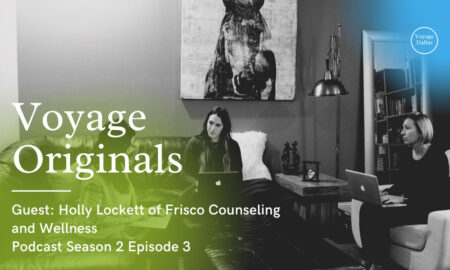Beth Lewis has an incredible personal story, one that has allowed her to develop a deep sense of empathy and the leadership skills that help her as an entrepreneur, therapist and mentor and teacher to rising therapists.
Therapy has come a long way over the years and we believe a lot of credit for the societal shift in attitudes towards therapy should go to therapists like Beth – hard working and relatable. She’s got an incredible journey and her life story no doubt is an important asset that allows her to help others.
She’s also a content partner, content partners help Voyage in so many ways from sponsoring our mission, to spreading the word about the work we do and collaborating with us on content like this.
There is so much to learn from her experience as a therapist and business leader.
Connect with Beth & Beth Lewis Therapy Group
Voyage Story: https://voyagedallas.com/interview/meet-beth-lewis-beth-lewis-therapy-group-fort-worth-tx/
- Address: 1814 8th Ave, Fort Worth, TX 76110
- Website: BethLewisTherapy.com
- Instagram: @BethLewisTherapyGroup
- Facebook: @BethLewisTherapy
Transcript:
Alex (Host): Beth Lewis. Thank you so much for joining us on the podcast today.
Beth Lewis: Thank you for having me.
Alex (Host): If you wouldn’t mind, would you briefly just kind of tell us who you are and what you do so that we can sort of contextualize your journey a little bit by, by giving us this end point or current quite maybe the better way to work that?
Beth Lewis: Yeah, I am Beth Lewis. My credentials are you see this often when seeking therapy, my [00:02:00] credentials are LPC. S which stands for licensed professional counselor supervisor. There are a lot of acronyms for therapists, but I am a therapist and I’m a family therapist, not a massage therapist, not any other type of therapist, but the psychotherapist is what we’re often called.
Beth Lewis: And I have a master’s degree in this field and as well, 3000 hours of clinical work post-graduate degree. Pre licensure that we are required by the state board to achieve. So we therapists are very proud of our education, which is why we kind of shrug our shoulders a little and frown upon those that call themselves life coaches and whatnot.
Beth Lewis: very different, very different, trade, uh, very different skillset. Let’s see. So family therapist, I have a. Really beautiful, small private practice [00:03:00] on the south side of Fort worth, Texas. And we see the whole family. Basically we can see the whole family, I it’s myself and a staff of four others currently.
Beth Lewis: And I’m looking to grow that. And, you know, I have wanted to work with families, uh, specifically for me, I’ve wanted to work with families of divorce since my own family went through. They’re divorced my own family, being my family of origin, my parents divorce. I’ve really wanted to work with the kids that go through divorces.
Beth Lewis: and, and that’s what we do. We work, I’m a, I’m a strong child advocate first. but I, funny enough, I don’t see children. I work with parents. I work with the adults because I feel the adults. How the ones that need to be spoken to if children are struggling. So what I do is I run a private practice. I see my own full load of clients each week [00:04:00] and pride myself in being part of the.
Beth Lewis: Equation that is trying to break the stigma of therapy and trying to make therapy a much more self-care mainstream. This is most everybody does it type of type of thing. and I feel like we’re, we’re pretty involved on that now. Yeah, I think that, that does that answer that question. I feel like,
Alex (Host): yeah, it does.
Alex (Host): It does. And I definitely want to, circle back to that, that I’m in a lot of the things that you talked about and we’ll get to them in the, in the course of this conversation, I’m sure. even with, with, you know, with the licenses and the 3000 clinical hours of workup, pre-licensure the it, your journey was not.
Alex (Host): You know that the straightforward left high school went to college, going to get the degree in the licensure. And now I’m practicing. can you [00:05:00] give us that, uh, that the overview of your journey to get to this point?
Beth Lewis: Absolutely. And you know, Alex, I’ve had the honor of various people, various interviewers, various.
Beth Lewis: groups of professionals who have asked me to speak to this end and I’m thrilled and honored that, that ma some find my story. Interesting. I find it, uh, Sometimes I find it frustrating because I wanted to be on track. I wanted to go from high school to college and pledged a sorority and do all the things and go to football games and, and kind of have that collegiate path.
Beth Lewis: And I did not, I ended up. After high school, I was a really strong student in high school. I went to a small east Texas high school and, graduated and went to a state university that was in that [00:06:00] town and really kind of failed out because my family of origin. I wasn’t, I wasn’t ready for college really is what we could, could, could go to.
Beth Lewis: But my family of origin went through that divorce my senior year, and it was very painful for me. And, it really kind of shook my foundation and I ended up, kind of packing up my heartache if you will, and going to Dallas, my mother and I both moved to Dallas and, and I found my way into. Deep LMS music scene in the nineties.
Beth Lewis: And I felt welcomed there and I I’m grateful for that music scene. I feel like it was a net that caught me when I was kind of falling. And, I spent instead of. Years in college and the Greek system and football games. I spent the next many years, creating music, writing music, uh, joining band, joining the band, with some really strong [00:07:00] musicians.
Beth Lewis: I’m, I’m still kind of. Tickled with the experience I had at that time, because I was really exposed to some of the better musicians that Debell them had at that time. And, wrote music and we toured up and down the east coast. And, I got my sheriff tattoos and met all my, my friends at that time that are still friends of mine today.
Beth Lewis: And they’re still doing music and they’re still creatives and going that path also. Kind of sidelined me into the deep Ellum drug culture and. Well, I did not become a drug addict while I did not do a lot of drugs. I did my share and I met people who were becoming drug addicts and who were doing more than their share.
Beth Lewis: And with that, I had a very close girlfriend who ended up passing away from, from a drug overdose. And that dumped me into an even darker place, needless to say, [00:08:00] With that I ended up kind of, if you will running away from home, I was 22 years old and while most poor graduating college and moving on to graduate school, I was running away from home.
Beth Lewis: I literally got on a midnight Greyhound bus from Dallas to new Orleans and I spent the next year. In new Orleans in squat houses and running around kind of on the streets, if you will kind of panhandling and met a, an entire culture there, that of kids that were as lost as I more. Than I, and they were, we would find squat houses together, which are just kind of abandoned houses or no one’s paying attention.
Beth Lewis: And you kind of kind of sleep on the floor, sleep on an old sofa that’s there. And, that’s what we did. And we got, we ate food that was being put out to the trash at the end of the day. This is also true. And it just kind of cracks me up in a, [00:09:00] in a dark humor kind of way. But we, I did that for the better part of a year.
Beth Lewis: And I ended up coming back to that. At the end of that very tired year with an ulcer and with a lot of signs of high stress and poor lifestyle. And it was at that point that I started back into, well, we, we were making music and doing all those things and kept doing that. Continued getting back on path, touring the east coast, doing up and down the east coast, touring around the country AU van style with the band I was in.
Beth Lewis: And we, but being back in Dallas, Get the bottom back underneath me and a foundation back underneath me. And I stayed that music route for a while. And then I’m married another musician. Who’s still a professional musician today and he and I had a daughter and she’s a musician and she’s spectacular.
Beth Lewis: She’s currently studying at Parsons in New York, studying photography. She’s 19 now. And I went to school at the age of 31. I decided I’m going to [00:10:00] do that thing. That called me when I was 18, which is I’m going to go study. How to help families of divorce and how to help families that struggle, which mine did.
Beth Lewis: And I had done. and so I got my bachelor’s degree at 31 from UT Dallas. And then took a year to work. And then I went for my master’s degree in professional counseling at Texas Westland. and somewhere in there I had my daughter and she stayed on my hip for the bulk of that. Then I graduated with that master’s degree and did those 3000 hours and finished up with that.
Beth Lewis: I call that the internship and then I opened a private practice and it’s been then like this.
Alex (Host): Thinking about that, that, that year or so in new, in new Orleans. And there, there are so many people that share that portion of the story, that are unable to get the bottom back underneath. What do you attribute to, to how, how were you able to do that?
Alex (Host): And [00:11:00] what do you attribute your ability to restabilize to
Beth Lewis: 100%? My mom, my mom re stabilized me. My mom didn’t give up. My mom kept and I don’t know how we did it back then. Pre pre cell phones. I mean, I remember having a calling card that one of the kids in the squad house had stolen from somebody and.
Beth Lewis: Yes, I’m admitting to breaking the law. Right now, we were using this person’s calling card to call people from a payphone. So I would use the calling card. To call people, call my mom from a payphone. And I talked to her that way for the year that I was there. And then the calling card fund got shut down because someone became privy.
Beth Lewis: I mean, and those of you who don’t know what a calling card is, you can just kind of Google that and figure it out. But. We didn’t have cell phones and we didn’t have social media. So how the communication happened is still a little mysterious to me, but it did. And my mom is a [00:12:00] strong human being. And while she was part of the equation that rocked our family up a bit, she was also part of the solution.
Beth Lewis: And she brought me back. She brought me back to Dallas. And let me live with her and she kind of nurtured me back to health, if you will. And you know, interestingly enough, there is the crew that I ran around with in new Orleans. Some of them, yes. Uh, a couple of them have passed away, way before their time, because they weren’t able to get that bottom back under them.
Beth Lewis: You’re right. And a couple of them though, went on to do really spectacular things. You know, one is in, one is living in LA and he’s a writer and he’s a photographer and he’s doing some really creative things. And, another move to Austin and he really kind of shook off a lot of the underbelly of new Orleans.
Beth Lewis: He was actually raised in new Orleans and he shipped that off and did some really great things in Austin. So there’s some really success stories, too. out [00:13:00] of that group, that’s, that’s intriguing still today because you’re right. Not everybody had the working knowledge, I guess, on how to, how to recover.
Beth Lewis: They didn’t have someone with. A life jacket from that was that they threw at them. You know, so yeah, my mom, my mom has the answer to that question
Alex (Host): then how does this, the journey that, that brought you to where you are now, how does that inform the work that you’re actively doing?
Beth Lewis: I hope that because of where I’ve been and what I’ve done, I hope that my therapy and the therapists I teach.
Beth Lewis: And our therapy group as a whole has a whole lot of grit and texture to it. I hope that I breathe my pass into my work on a daily basis. And I hope it shows up. I hope that my clients who sit in my therapy room with me on my sofa and they say, I hope they, I hope they feel. My heart and [00:14:00] soul because my heart and soul is shaped by these chapters.
Beth Lewis: In my twenties, my heart and soul is shaped by the developed music scene. My heart and soul is shaped by the time in new Orleans. My heart and soul is shaped by my mother who is strong and wise beyond her years. And I hope that it shows up through the words we choose through the lens we use. I hope it shows up that way.
Beth Lewis: That’s, that’s how I feel about that question.
Alex (Host): You, you alluded to this a little bit in your, one of your earlier answers about how the, the idea of therapy and the, the kind of thought process around therapy and the culture is becoming a little bit more mainstream. I want, I would love for you to speak to that, but it also, I’m also curious how the culture of therapy itself may have shifted, in recent years.
Alex (Host): And if that has impacted how, how therapy has come mainstream.
Beth Lewis: I think that the generation [00:15:00] of my daughter, again, she’s 19, I think that the generation, her generation really embraces therapy. I think that social media has been good for therapy. I think the pandemic and social media. Have been good for therapy because through the pandemic, we all did things virtually.
Beth Lewis: And we were posting things because we were kind of bored and we were at home and there were a lot of posts about seeing their therapist and going on tele-health with their therapist. And I feel like that really helped. Not only did it normalize, working from home and it normalized virtual meetings, it also normalized therapy as a part of.
Beth Lewis: Just kind of sustaining life and quality of life. And that I feel happened in the last couple of years, pre pandemic, or even just 3, 4, 5 years ago, therapy was kind of looked at as something you did. If you had a problem, my gosh, you could. We kept it on the download. We weren’t [00:16:00] talking about it. We weren’t boastful about seeing a therapist.
Beth Lewis: And the funny thing is, is our board. I’ve got to look and see if this has been updated. I’ve kind of just turned the other way, quite frankly, but the board for a lot of years, in my beginning years, as a therapist, It was stated in our by-lines that we weren’t allowed to have signage, big visual signage.
Beth Lewis: Like we couldn’t have a storefront, we couldn’t have big visual signs so that we could honor the confidentiality and the privacy of our clients who walk into our offices. So no one would see them walking into a therapist office. So we were part of the oppressive problem. We were part of the problem that said, Hey, you know what, if you’re walking in this office, don’t let anyone know.
Beth Lewis: And. I just call it 100% bullshit on that. Like, I, I feel we need to absolutely speak up that we’re going to therapy and this is my therapist and this is how often I go and kind of own it. Like my daughter’s generation. Does they have no problem talking about it and they have no problem saying, yeah, this is my therapist name.
Beth Lewis: I see her twice a week. I see her once a week. [00:17:00] I see her through tele-health. I go to her office, whatever the case may be. And before that, my generation tended to not only keep it on the download, but we wouldn’t brag about it. And it certainly, if we were going, it was because there was a problem. And now I like being part of the solution that suggests that you go to therapy to take care of yourself.
Beth Lewis: Not because there’s a problem. It’s like, I have a personal trainer and you wouldn’t say to me, oh my God. Why do you have a personal trainer? Are you overweight? Are you not feeling healthy instead? You would probably reply with, wow, that’s great. A personal trainer. Oh my gosh. I need one. Give me the name.
Beth Lewis: And when we say I’ve got a therapist, oftentimes several years ago, the, the reply would be, oh my gosh, what’s wrong? What are you going through? And now a day. I hope that the exchanges, I got a therapist. Oh my God. That’s so great. I have one too. Or how, how often do you see yours and have a really normal [00:18:00] conversation about it?
Beth Lewis: And that’s, the difference, I feel like the, what has happened to kind of redirect therapy and the stigma and kind of. Debunk the stigma, people are owning it and they’re posting about it. And, and they’re talking about it and it’s not about going to therapy because there’s a problem. and I certainly hope my little small, but mighty practice is a part of that, uh, that, that
Alex (Host): exchange mentioning a, a personal trainer.
Alex (Host): I know that, you know, in the, in the realm of. Physical fitness. You know, I think most personal trainers would say that, you know, if you see them twice a week, that’s, you know, that’s good at all. But if you’re all you’re eating has picked Donalds, uh, that seeing them twice a week, isn’t really going to do much.
Alex (Host): Is there a similar lifestyle component to mental health?
Beth Lewis: Absolutely. And, and, uh, [00:19:00] lifestyle component that. Penn is called the sheen method. I’m a very big believer in lifestyle being a supporter or a destroyer of our human condition. And, the sheen method is sleep, hydration, exercise, expression, and nutrition.
Beth Lewis: And I believe that when those five tenants are basically. Most days of each week, we are more qualified to combat anxiety, depression. Compulsivity the things that rattle us, when we’re, when we’re in our darker places. So lifestyle absolutely. I believe it. And you know, as therapists, I get it, we have clients come in and they’re in a, they’re in a bad space or they’re in a, uh, I don’t like to say bad space.
Beth Lewis: They’re in a darker space. They’re having a struggle happening in their life and they’re really wanting to work through it. And when a therapist [00:20:00] says, are you, are you hydrating enough? That sounds comical. Like, why the hell would you just ask me if I’m hydrating enough when I’m telling you. Uh, divorce I’m going through.
Beth Lewis: Well, the thing about it is, is that that’s exactly what we therapists need to be asking. We need to be asking about sleep cycles and hydration and exercise and nutrition. And that expression piece is a whole nother category. That’s very important. How are we expressing ourselves? Are we journaling? Are we jogging?
Beth Lewis: Are we playing the drums? Are we playing the guitar? Are we writing music? Are we painting? because those feelings, those emotions belong. In a creative place. So lifestyle. Yes. And that’s part of the lens we use here at Beth Lewis therapy group is my sheen method, which is to really hone in on the lifestyle of our clients outside of our therapy sessions.
How
Alex (Host): long have you been, uh, operating with the sheen method and sort of what are the origins of its development in your [00:21:00] practice?
Beth Lewis: When I was an intern, remember I said those 3000 hours, we refer to as the internship, it was during those 3000 hours. When I wrote that. because it, honestly, it was kind of self-disclosure, it was watching myself in my darker hours.
Beth Lewis: What helped me. And as I started kind of talking to my clients about how do you live outside of here? I started connecting the dots that wow, our lifestyle, our behavior outside of here is huge. It matters so much on whether it facilitates or destroys our, our psyche. And I wrote that, so that. Was an intern was probably 2000.
Beth Lewis: I wrote that about 12 years ago and I’ve used it. I’ve put it down, I’ve tweaked it. I’ve used it, I’ve put it down, I’ve tweaked it. and it’s just coming back, uh, with, with, uh, with, uh, grant fervor in the last couple of [00:22:00] years, and I’ve spoken about it to different audiences. and it really has. Has legs, it works.
Beth Lewis: it’s something that wanted something that puts us in control of our scenario, which is a beautiful gift to give to anybody. and so, uh, yeah, the sheen method has been in the works and been working for the past 12 years, I guess, in
Alex (Host): your life and in your practice, what are some barriers that hold you back?
Alex (Host): And my professional work or, or in your, or in your personal life or your ambitions as an, as an artist or kind of any, it is sort of where do you stop pursuing what you want to be pursuing?
Beth Lewis: That’s such a great question. And it’s such a great question. It tripped me up. I think that what stops me and what holds me back is what people will think.
Beth Lewis: I’m guilty of that. I like positive feedback. I like to be liked and that’s not super high functioning. I know that, but it is the truth about [00:23:00] Beth Lewis. I liked, gold stars. And so if I think someone’s not gonna like something that stops me often, and I have learned in the past handful of years, I’ve really been staring that down and, and looking that in the eyes because the more.
Beth Lewis: I allow my, my true self to show up. And the more I allow my swagger to swag, I do better. So, you know, I think that that would be the answer. What, what stops me often is what people will think. And that has been, uh, a work of my, on my end, in the last several years, really looking at that and, and, and blowing it up and making sure that I kind of set myself free from.
Beth Lewis: State of mind. Does that answer
Alex (Host): that question? It does. And it might, it might even answer that the flip side of that question, which is what propels you forward and what kind of, what kind of motivates you to, to continue moving forward.
Beth Lewis: I [00:24:00] really want to help people. I really want people to not feel alone when, and I really want people to know that.
Beth Lewis: Sadness, anxiety, depression, compulsivity all these things. I want them to know that that is actually part of our human makeup. It does not make them weird. It doesn’t make them diagnostic at a diet. It doesn’t make them in need of a diagnosis. I don’t think it necessarily even needs medication all the time.
Beth Lewis: Sometimes it does. I just went, I really want to spread the word and I really want to help people know that their darker days are part of their, of their grit. It’s part of what makes them special. It’s part of what makes them capable of helping others. It’s part of what makes them connectable. And, and so that motivates me.
Beth Lewis: It moves me to make sure I’m accountable to make sure I own my own ups and downs. So that I can model for others [00:25:00] that you know, where as, even as a therapist, we were a flaw, we’re a flawed population, but so is every population, you know, and those therapists out there and, and the, the yoga instructors and the life coaches and all the people that have.
Beth Lewis: This modality of I’ve got it all together. Well, I wouldn’t want to take their yoga class and I don’t want them to be my life coach because I want to talk to somebody who’s got, who’s got some grit and who’s got some life experience and who’s got some flaws and who’s learning themselves how to do life to the best of that ability.
Beth Lewis: So what motivates me is the true desire to help people not feel alone and to shine a light on all the color that each of us have. Beth.
Alex (Host): That is an incredibly powerful word. And so one, thank you for that, but I also want to give you a chance to, uh, where can, where can people find you if they want some more information about, about you and the Beth Beth Lewis [00:26:00] therapy
Beth Lewis: group?
Beth Lewis: Our website is, has everything on it. My poor website guy. I think that he sees emails come from me and he just shutters, but, uh, our website is best Lewis therapy.com. on that you can schedule in our practice via tele-health or. We also have our podcast is on there. Season one is available on our website.
Beth Lewis: Season two gets recorded in a couple of weeks. I also have a, an online therapy program called the groovy you, that’s at the groovy u.com, but there are also links for it. At best Lewis therapy.com. The groovy U is an online therapy subscription type thing. It does not cost much, but it’s a 21 day. effort to, to kind of find balance in your own grit and in your own life with your own swagger and really bringing yourself to the table with all of [00:27:00] your glory and working do 21 days to make sure all of that glory shows up through most of your life.
Beth Lewis: and that. TheGroovyYou.com And again, BethLewistherapy.com
Alex (Host): Beth five out of five gold stars for, for your appearance here on the podcast. thank you for joining us.
Beth Lewis: Thank you so much, Alex. It’s been my pleasure. I love it. Thank you so much.


















